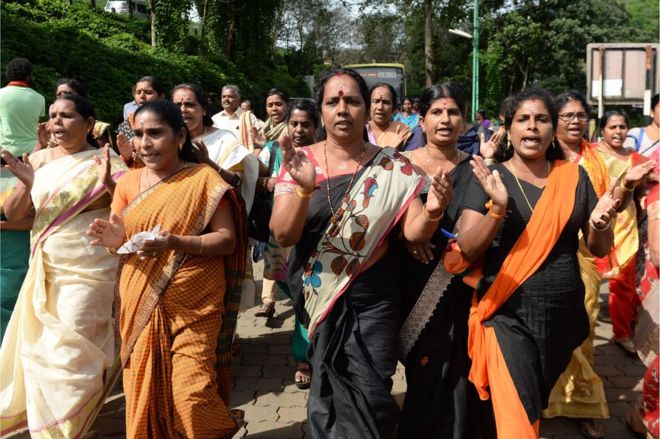Protesters block women from entering Hindu shrine

The Sabarimala temple barred women of “menstruating age” – roughly between 10 and 50 – until the Supreme Court lifted the ban last month
MUMBAI: Thousands in India’s southern state of Kerala are protesting against women of all ages entering one of Hinduism’s holiest temples for the first time.
The Sabarimala temple barred women of “menstruating age” – roughly between 10 and 50 – until the Supreme Court lifted the ban last month.
But protesters attacked vehicles carrying female reporters and stopped a woman from entering the temple.
Tensions may rise as more women are expected to attempt entry.
Hinduism regards menstruating women as unclean and bars them from participating in religious rituals. The Sabarimala temple was due to open its doors to all women on Wednesday at 17:00 IST (11:30 GMT).
Security forces have been deployed and they have already stopped many Hindu groups from preventing women entering the temple. Clashes between police and protesters have also been reported, but nobody has been hurt.
The protesters also include many women – they have participated in rallies, blocked roads and checked vehicles heading towards the temple to see if they contain women between 10 and 50.
Every year, millions of male devotees trek up a steep hill to visit the shrine, which is believed to be about 800 years old. They undertake a rigorous 41-day fast before they begin the pilgrimage.
While most Hindu temples allow women to enter as long as they are not menstruating, the Sabarimala temple is unusual in that it is one of the few that does not allow women in a broad age group to enter at all.
The millions of Hindu devotees walking across India
The campaign to allow women into the temple gathered momentum in 2016 after a protest by female students. They were outraged by the Sabarimala temple chief’s statement that he would allow women to enter only after a machine was invented to detect if they were “pure” – meaning that they weren’t menstruating.
Nikita Azad, who started the campaign, told the BBC at the time that there was no “right time” to go into a temple and that women should have the right to go “wherever they want to and whenever they want to”.
Petitioners who appealed to the Supreme Court to lift the ban said that this custom violated equality guaranteed under India’s constitution. They added that it was prejudiced against women and their right to worship.
Supporters of the ban argued that the practice had been in effect for centuries, and there was no need to change it now.
But the court struck down the ban on 28 September, calling it “unconstitutional”. The ruling immediately sparked protests, which have since gathered momentum.
This is the third religious site in India where women have gained the right to enter through judicial intervention. Courts had earlier directed officials at the Hindu temple Shani Shingapur and the Muslim Haji Ali shrine, both in the western state of Maharashtra, to allow women inside.





